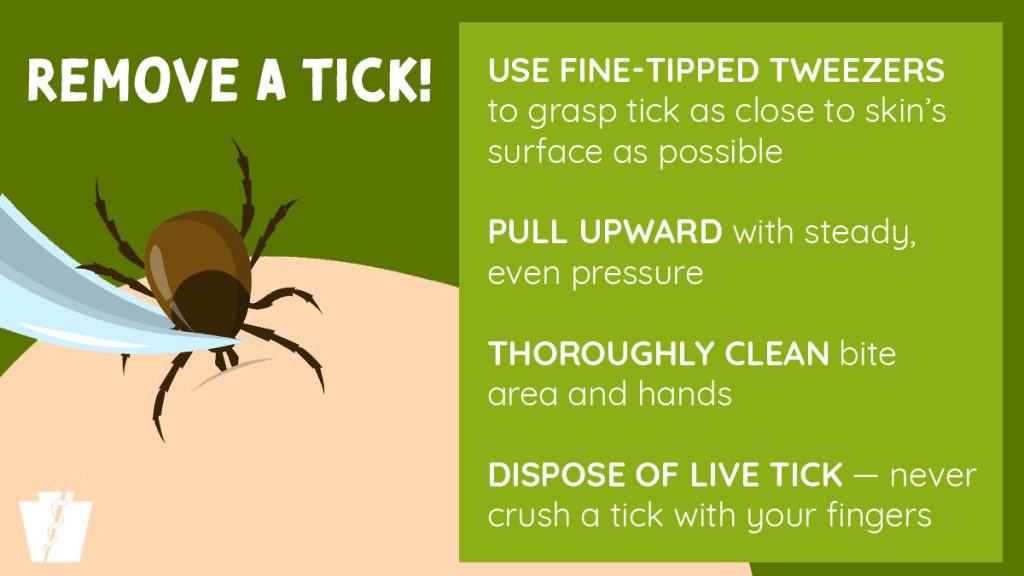The Shapiro Administration last week discussed the importance protecting against tickborne and other vectorborne Illnesses, while highlighting the opportunities to spend time outdoors in Pennsylvania’s beautiful public lands.
Vectorborne diseases are diseases transmitted by the bite of an infected tick or mosquito. In general, vectorborne diseases are on the rise in the United States and in Pennsylvania.
“Whether visiting one of our 124 state parks or the Commonwealth’s more than 2.2 million acres of state forestland, outdoors enthusiasts must be cognizant of their surroundings when enjoying Pennsylvania’s great outdoors,” said Department of Conservation and Natural Resources (DCNR) Deputy Secretary Mike Walsh. “Just as strong sun or severe weather demand vigilance, Lyme disease requires the hiker and hunter, angler and birder all to be prepared and proactive.”
Walsh noted the first line of defense against Lyme disease and any other tick-borne illnesses is avoidance of tick-infested habitats, such as areas dense with shrubbery or tall grass. Proper use of personal protective measures such as repellents and protective clothing also were suggested when enjoying public lands.
Pennsylvania reported 2,900 cases of Lyme disease in 2021. Over the last several years, the Commonwealth has consistently recorded one of the highest counts of suspected Lyme disease cases in the United States.
“Pennsylvanians need to be aware that ticks associated with causing Lyme disease are found everywhere across the Commonwealth, including green spaces in large cities, rural areas, and in state parks and forests,” said Dr. Wendy Braund, Deputy Secretary for Health Preparedness and Community Protection. “We encourage Pennsylvanians to always check themselves and their pets for ticks after engaging in outdoor activities and to immediately contact a health care provider if they have symptoms of Lyme disease.”
Recommended precautions for anyone venturing outdoors include:
- Apply tick repellents containing permethrin to clothing, and EPA-registered insect repellents such as DEET to exposed skin before entering the outdoors. Reapply as needed according to product label instructions.
- Wear light colored outer clothing and tuck shirts into pants, and pants into socks.
- Walk in the centers of trails, and avoid wooded and brushy areas with low-growing vegetation and tall grasses that may harbor ticks.
- After returning home, remove all clothing, take a shower, and place clothing into the dryer on high heat to kill any lingering ticks. Examine gear such as backpacks for ticks.
- Conduct a full-body tick check using a hand or full-length mirror, including hidden areas such as the scalp, ears, armpits, belly button, and between the legs.
- Check over any pets exposed to likely tick habitats each time they return indoors.
- If a tick is found attached to your skin, use tweezers to remove it carefully, including the head.
If you believe you have been bit by a tick, it is important to speak to a doctor immediately. Treatment with antibiotics during the early stages of Lyme disease can help prevent the onset of more severe symptoms. If not treated promptly, Lyme disease may lead to severe symptoms affecting the heat, nervous system and joints.
Symptoms of Lyme disease can include a bulls-eye shaped rash, fever, chills, headache, fatigue, muscle and joint aches, and swollen lymph nodes. It is important to know that someone bit by a tick carrying Lyme disease may not always get a bulls-eye shaped rash. For more information about tickborne disease prevention, visit DOH’s Tickborne Diseases website.
Generally, vectorborne diseases are also on the rise in Pennsylvania, which includes diseases such as West Nile Virus (WNV). The virus was first detected in North America in 1999 and found in Pennsylvania in 2000.
West Nile fever is a case of mild disease in people and causes flu-like symptoms. It typically lasts only a few days and doesn’t appear to cause any long-term health effects. More severe diseases due to a person being infected can be West Nile encephalitis, West Nile meningitis or West Nile meningoencephalitis.
“The best parts of summer aren’t itchy bites and being sick, so we want people to protect themselves from mosquitoes and mosquito-borne illnesses,” said Department of Environmental Protection Executive Deputy Secretary Jessica Shirley. “It doesn’t take much to fight the bite and protect yourself and your family from mosquitoes. Simple steps and insect repellent can go a long way towards a safe and happy summer.”
To control mosquitoes around your home, DEP encourages Pennsylvanians to:
- Use an EPA-registered insect repellent.
- When indoors, use air conditioning, window screens or insecticide-treated mosquito netting to keep mosquitoes out of the home.
- Reduce the number of mosquitoes outside the home or hotel room by emptying or routinely changing standing water from containers such as flowerpots, pet dishes and bird baths.
- Wear long sleeves and pants when outdoors.
Visit DOH’s Vectorborne Diseases website and DEP’s West Nile Virus information page more information.
Colonel Denning State Park has 273 acres of woodland and a 3.5-acre lake. The park serves as a gateway to the 96,000-acre Tuscarora State Forest, which surrounds the park.
Visit DCNR’s website for more information about the state parks and forests, and check out DCNR’s Calendar of Events for events on public lands.




